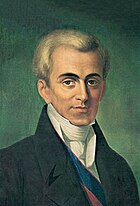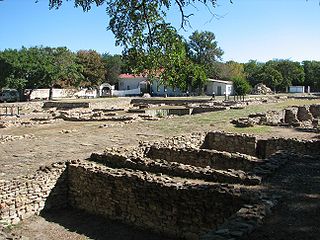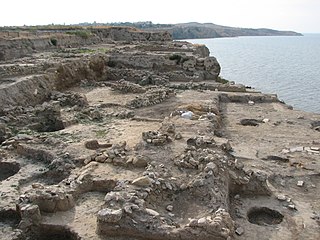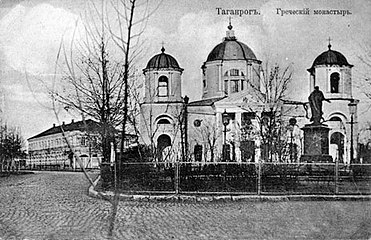Greeks in Russia and Ukraine
Genocide of the Pontic Greeks in Yessentuki, Russia | |
| Total population | |
|---|---|
| Regions with significant populations | |
| Languages | |
| Religion | |
| Related ethnic groups | |
In former Soviet republics, about 70% are Greek speakers who are mainly descendants of
History
Ancient

In Greek mythology, various contacts with the part of the world that was later named Russia or the Soviet Union are recorded. The area was vaguely described as the Hyperborea ("beyond the North wind") and its mythical inhabitants, the Hyperboreans, were said to have blissfully lived under eternal sunshine. Medea was a princess of Colchis, modern western Georgia, and was entangled in the myth of Jason and the Golden Fleece. The Amazons, a race of fierce female warriors, were placed by Herodotus in Sarmatia (modern Southern Russia and Southern Ukraine).[4]

In historical times, Greeks have lived in the present Black Sea region of Russia and the Commonwealth of Independent States since long before the foundation of Kievan Rus' (Kyivan Rus'), the first Russian state. The Greek name of Crimea was Tauris, and in mythology it was the home of the tribes who took Iphigenia prisoner in Euripides' play Iphigenia in Tauris.
Trade relations with the
The Greeks had to fight off
Medieval
Black Sea trade became more important for
Many Greeks remained in Crimea after the
Relations with the people from the
Subsequently, Byzantine power in the Black Sea region waned, but ties between the two people were strengthened tremendously in cultural and political terms with the baptism of
The post as Metropolitan bishop of the Russian Orthodox Church was, in fact, with few exceptions, held by a Byzantine Greek all the way to the 15th century.[5][6] One notable such prelate was Isidore of Kiev.
Tsarist Russia

With the
Greeks continued to migrate in the following centuries. Many sought protection in a country with a culture and religion related to theirs. Greek clerics, soldiers and diplomats found employment in Russia and Ukraine while Greek merchants came to make use of privileges that were extended to them in Ottoman-Russian trade.

Under
There were over 500,000 Greeks in the
There have been several notable Greeks from Russia like Ioannis Kapodistrias, diplomat of the Russian Empire who became the first head of state of Greece, and the painter Arkhip Kuindzhi.
Soviet Union
In the early years after the
About 50,000 Greeks emigrated between 1919 and 1924. After 1924 Soviet authorities pressed Greece to repatriate 70,000 Greeks from Russia, although few actually had ancestors who were citizens of the Greek state.[6]
On the other hand, as with other ethnic nationalities, the early Bolsheviks under Vladimir Lenin and his immediate successors were willing to encourage ethnic culture manifestations of those ready to work within the new revolutionary regime.
In this framework, a
However, official promotion of the Rumaiic did not go unchallenged. In the Πανσυνδεσμιακή Σύσκεψη (All-Union Conference) of 1926, organized by the Greek-Russian
Different sources referring to this period differ in putting the emphasis on the positive or the negative aspects of the 1920s Soviet policy.
The Greek Autonomous District in Southern Russia existed in years 1930-1939. Its capital was Krymskaya.

The policy underwent a sharp reversal in 1937. At the time of the
Greek Orthodox churches, Greek-language schools and other cultural institutions were closed. During the "
In the immediate aftermath of the World War II German invasion of the Soviet Union, ethnic Greeks were included in the 1941–1942 "preventive" deportations of Soviet citizens of "enemy nationality", together with ethnic Germans, Finns, Romanians, Italians, and others - even though Greece fought on the Allied side. The Greeks then suffered under Nazi occupation and when Crimea was liberated in 1944, most of the Greeks were exiled to Kazakhstan, along with the Crimean Tatars. (Some of these Greeks, known as Urums, spoke a variant of the Crimean Tatar language as the mother tongue they adopted during centuries of life in proximity to the Tartars).

In a further wave, about 100,000
At about the same time, the last major immigration occurred in the opposite direction, of Greeks going to Russia and the Soviet Union. After the end of the
After the de-Stalinization, Greeks were gradually allowed to return to their homes in the Black Sea region. Many have emigrated to Greece since the early 1990s.[6]
A new attempt to preserve a sense of ethnic Rumaiic identity started in the mid-1980s. The Ukrainian scholar Andriy Biletsky created a new Slavonic alphabet but, though a number of writers and poets make use of this alphabet[citation needed], the population of the region rarely uses it.[11]
Present-day Russia and Ukraine
| Part of a series on |
| Greeks |
|---|
 |
|
By country Native communities
|
|
Groups by region African Greeks:
Eastern Greeks: Northern Greeks:
Southern Greeks:
Other Greek groups: |
|
Religion
|
|
Languages and dialects
Other languages
|
Many Greeks in the Soviet Union sought to emigrate to
Today most Greeks in the former USSR speak Russian,[12][13] with a significant number speaking their traditional Pontic Greek. Pontian is a Greek dialect that derives from the ancient Ionic Greek dialect and resembles ancient Greek more than the modern "demotic" Greek language.
Until recently, the ban on teaching Greek in Soviet schools meant that Pontian was spoken only in a domestic context. Consequently, many Greeks, especially those of the younger generation, speak Russian as their first language.[13]
Linguistically, Greeks are far from being unified. In Ukraine alone, there are at least five documented Greek linguistic groups, which are broadly categorized as the "
Greeks were permitted to teach their own language again during
Cosmonaut Fyodor Yurchikhin has Greek Ancestry.
Close to 35% of the Russian Greeks live in the Caucasian province of Stavropol Krai, mainly Caucasus Greeks and Pontic Greeks. The city of Yessentuki is regarded as the Greek cultural capital of Russia. Many of the famous Greek Russians, like Euclid Kyurdzidis hail from this city where Greeks constitute 5.7% (Up from 5.4% in 1989) of the total population. Greeks constitute 3% (2.9% in 1989) of the population in Zheleznovodsk City and 4.7% in Inozemtsevo (5.1% in 1989). But the majority of the Greeks live in the rural regions of Stavropol and major concentrations can be found in the rural districts of Andropovsky (3.3% in 2002, 2.1% in 1989), Mineralovodsky (3.8% in 2002, 3.4% in 1989) and Predgorny (16.0% in 2002, 12.2% in 1989).[14] While the ethnic Greek population decreased in many provinces due to emigration, in the Stavropol province it actually rose from 26,828 in 1989 to 34,078 in 2002. A significant ethnic Greek population also exists in nearby Krasnodar Krai.
In recent years, many Russian émigrés of Greek descent who had left in the early 1990s have returned to Russia, often with their Greece-born children. The return emigration is largely due to the economic crisis that Greece has been experiencing since 2008.
Cultural heritage
- Ancient Greek towns
- Other places
-
Arkhip Kuindzhi Apartment Museum in Saint Petersburg
-
Monument of Ioannis Kapodistrias in Saint Petersburg
-
Greek Jerusalem monastery in Taganrog (demolished)
References
- ^ Population date rosstat.gov.ru
- ^ "Η έξοδος προς τη Ρωσία | Pontos News". Archived from the original on 3 April 2017.
- ^ "National composition of the population". 2001 Ukrainian Population Census. State Statistics Committee of Ukraine. Archived from the original on 17 December 2011. Retrieved 30 March 2023.
- S2CID 22946203.
- ^ a b c d "History of the Crimea". Archived from the original on 4 April 2007. Retrieved 8 April 2008.
- ^ a b c d e f g "NUPI Centre for Russian Studies, Ethnic groups, Greeks". Archived from the original on 14 February 2007. Retrieved 8 April 2008.
- ^ (in Greek) The Campaign in the Ukraine Archived 2008-03-09 at the Wayback Machine, at sansimera.gr
- ^ Kisilier, M. L., ed. (2009). Literaturicheskaya i etnokul'turnaya situatsiya v griecheskih tselah Priazov'ya (Literature and ethnocultural situation in Greek settlements in Pryazovia) (PDF). p. 0.2.3. Retrieved 12 January 2022.
- ^ ΟΨΕΙΣ ΤΗΣ ΕΚΠΑΙΔΕΥΣΗΣ ΚΑΙ ΤΗΣ ΚΟΙΝΩΝΙΑΣ ΤΩΝ ΕΛΛΗΝΩΝ (in Greek). Archived from the original on 21 July 2011. Retrieved 15 January 2011.
- ISBN 0313274975, p. 274
- ^ Survey carried out in 2001–2004, organized by St. Petersburg State University
- ISBN 9781573560191. Retrieved 19 November 2014.
- ^ ISBN 9788182200630. Retrieved 19 November 2014.
- ^ "Территориальный орган Федеральной службы государственной статистики по Ставропольскому краю - Национальный состав населения". Archived from the original on 27 September 2009. Retrieved 19 November 2014.
Further reading
- Diamanti-Karanou, Panagoula. "Migration of ethnic Greeks from the former Soviet Union to Greece, 1990-2000: Policy decisions and implications." Southeast European and Black Sea Studies 3.1 (2003): 25-45.
| From Europe |
|
|---|---|
| From Asia | |
| From Africa | |
| Old Greek Diaspora |
|
|---|---|
| New Greek Diaspora |
|
| Traditional areas of Greek settlement | |
| Europe | |
| Caucasus and Central Asia | |
| Middle East | |
| Africa |
|
| Latin America | |
| Asia-Pacific | |
| |
| |||||||||||||||||||||||
| |||||||||||||||||||||||
| |||||||||||||||||||||||
| |||||||||||||||||||||
| |||||||||||||||||||||
Lists | |
|---|---|








